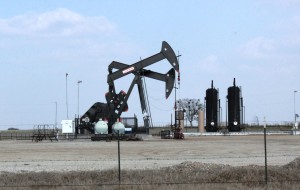Why Alaska is Reconsidering Texas-Inspired Oil Tax Cut

Dave Fehling / StateImpact
New oil production wells in Brazos County
Alaska funds its state government largely by taxing oil production. But last year, faced with dwindling production, the legislature narrowly passed tax cuts to lessen the burden on energy companies in hopes of encouraging more drilling and generating more tax revenue.
One Alaska lawmaker said they looked to the Lower 48 for inspiration.
“Because we kept hearing all the booming oil work that is being done in Texas and North Dakota and people said hey, that just goes to show you, Texas has a lower tax rate. And that just goes to show you how increased taxes are causing less exploration and development here in Alaska,” said Alaska State Sen. Bill Wielechowski, a Democrat from Anchorage.
Do Taxes Matter?
Texas has a severance tax of 4.6 percent on the market value of oil as it comes out of the ground, one of the lowest rates among major oil producing states. Alaska previously taxed the profits of oil companies at a 25 percent rate. Then, under a new tax bill passed last year, the rate was reduced to approximately 14 percent.
But production — and tax revenues — kept shrinking. Now, there’s a referendum set for this August to repeal the tax cuts. BP, ConocoPhillips, and ExxonMobil are paying for TV ads to defeat the referendum, contending that the tax cuts were already starting to spur more drilling and that in time, a “better investment climate…will lead to increased oil production, more jobs” and more tax revenue for the state.
Sen. Wielechowski disagrees. He supports the referendum to repeal the tax breaks, saying that research done for the legislature convinced him that tax rates don’t make much difference anyway.
“Alaska is an extremely profitable place to do business. The oil companies know that. The tax structure really doesn’t have a huge impact,” Wielechowski told StateImpact. “I know people find that counter-intuitive and hard to believe but every bit of research that we’ve seen shows that to be the case.”
Texas Tax Breaks
Attempts in Texas to reduce tax breaks on energy production have generally gotten little traction in the state legislature. Of particular concern to Texas lawmakers who felt the industry wasn’t paying its fair share were tax breaks awarded to natural gas producers. The state severance tax on natural gas is higher than for oil, 7.5 percent, but tax breaks can reduce the bite.
Some 14,000 active gas leases (about 10 percent of the total gas leases statewide) take advantage of tax breaks that reduce their rate to zero, according to the comptroller’s office.
In 2009, auditors found that 52 percent of refunds initially granted under a tax break to natural gas producers did not meet the state tax code. The Texas Comptroller’s office added more auditors and last year, only 17 percent of the natural gas refunds were found out of compliance according to information provided by the comptroller’s office.
Compared to five years ago when natural gas prices were higher, Texas is now getting about a $500 million a year less in severance taxes from natural gas, a drop of 26 percent.
By contrast, oil prices rose and production has reached levels not seen since the 1980s. The comptroller office says severance tax revenue from crude is up 120 percent compared to five years ago, totaling some $5 billion in the 2012-13 biennium.
With oil production and tax revenue up in Texas, the energy industry isn’t expecting any major challenges to how the state taxes it.
James LeBas, a former state revenue forecaster and now a tax expert for the Texas Oil & Gas Association, said while there will likely be interest in increasing the amount of revenue, “It may be very difficult to do in a period in which we will have a cash surplus and a large Rainy Day Fund balance. Chances for tax increases in the 2015 session are slim.”
